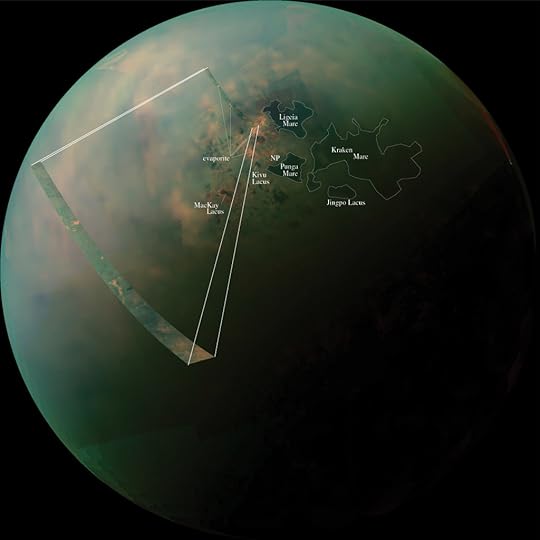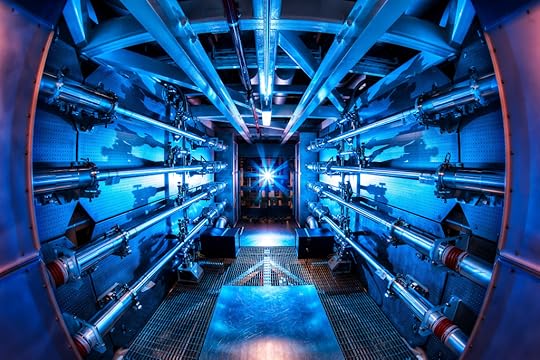Erik Wecks's Blog, page 9
November 2, 2013
Win $50 bucks for sharing on social media!
Help me get the word out about the sale on Aetna Adrift and you could win $50.00 at Amazon.
Simply share the link below on social media. Then make sure you let me know about it and you will be included in a drawing for a $50.00 gift card at Amazon.com
Here is your link: http://wp.me/p2KV8P-8E
The easiest way to make sure I find out is to include me in your social media blurb or you can always shoot me an email.
My twitter handle is @erikwecks
Facebook: Erik Wecks
And my email: erikwecks@gmail.com
Aetna Adrift on Sale Through November 10th!
AETNA ADRIFT: A PAX IMPERIUM NOVEL
Purchase a Kindle copy for only $.99 at Amazon.com
// ]]>
October 23, 2013
The Kraken Lives on Titan…
This afternoon JPL released a great new composite photo of Titan, one of Saturns moons. Titan is one of the most intriguing satellites in our solar system. It rains, and scientists suspect there are active volcanoes on the surface. Today’s picture shows there are even lakes, including one named for the infamous Kraken. Most of the time it has been cloudy at the North Pole since our probe Cassini arrived in 2004. However, as the north pole begins to enter its summer ,the weather cleared a bit and this September Cassini captured some spectacular images of the lakes on Titan.
Here’s the catch. The weather on titan isn’t based on water. With a surface temperature around -180 C, it’s cold, much to cold for liquid water. Instead the weather’s based on methane, ethane, and other hydrocarbons. (Recently JPL announced it rains plastic, or rather a common ingredient used to make plastic.) The lakes are made up of these hydrocarbons. (While there doesn’t appear to be much free oxygen in the atmosphere, let’s do the smoking indoors all the same, shall we?)
That isn’t to say that there isn’t any water on Titan. Water forms the bedrock on which these lakes sit. Many scientists believe that it occasionally erupts from vents, creating cryo-volcanoes. If true these vents may hint that underneath the surface titan has a buried ocean of water mixed with methane.
Titan’s atmosphere remains a bit of a mystery. Based on the age of our solar system most scientists would have expected Titan’s atmosphere to have eroded by now, blown away by the solar wind. This seems to be the case for other moons of about the same size that orbit Jupiter. What makes this atmosphere intriguing is both the continued presence of hydrocarbons in the atmosphere and the potential for liquid water buried beneath the surface. Of all the planets and satellites which make up our solar system, Titan is the one which seems to hold the most hope of finding life as we know it next door. That said, the hope seems truly slim, almost non-existent really. I believe that someday in the near future, we will know for sure. For now, Titan is one of those places in our cosmos which keeps me looking up.
Related articles
 Cassini Gets New Views of Titan’s Land of Lakes
Cassini Gets New Views of Titan’s Land of Lakes Plastic ingredient spied on Titan
Plastic ingredient spied on Titan Cassini Finds a New Nile River on Titan
Cassini Finds a New Nile River on Titan
October 16, 2013
P.E.T.R. (Part 2)
[This is part two of a three part comic short story. If you would like to start with Part 1, you will find it here.]
Bentley Panhurst stood on the sky-walk looking down on the green commons below. Robotic workers slowly swept up litter as squishy lumps of humanity trundled by without acknowledging them. Nearby, other doe eyed, green “synthetic humans”—as Bentley thought of them—gently trimmed the verge with their scissor like hands.
Bentley set down his artist’s portfolio case upon the ground and quickly unzipped the black leather. An impressive six-foot-seven, he stood a head taller than most. Passersby gawked at his gangling frame in its mauve, silk suit with a bright orange flower in the lapel as he fumbled with the bag on the ground below. Bentley could not remember a time when he fit in this world. He had always felt large and out of place—a sentiment he traced back to his birth, which had to be done by C-section. His unruly, red hair, over-sized freckles, and boat-like feet always caused a stir when he entered a room. It didn’t help that Bentley was a bit of a fop, although he didn’t know it himself.
He removed a somewhat worn piece of white poster board from the case and, after smoothing out the wrinkles, pressed the power key on the bottom right corner. He then turned to face the windows looking out over the crowded walk below. The paper in Bentley’s hands flashed to life. On both sides, bright, neon green letters erupted on a field of black. Declaring each letter in turn, it read, P-E-T-R. Then with a flourish, the letters flowed around the board. Until, coming to rest, they spelled out the name of the organization behind them. “People for the Ethical Treatment of Robots.”
“What rubbish,” he heard the man behind him mutter. Bentley could perceive the general disapproval as heads shook and tongues wagged below. He straightened his considerable spine and put on his most detached expression. He was used to this reaction.
In polite society, P.E.T.R. was considered at best, a nuisance, and at worst, a cause of sedition and public disturbance. Display of its logo or other related paraphernalia, while not strictly outlawed, would certainly be perceived as an act of civil disobedience worthy of official attention.
It wasn’t long before Bentley spotted the drone hovering nearby. He waved. It looked to be official, which was to be expected, but disappointed the activist. However, the official drone was soon joined by a second, bright red drone. This hyperactive synthetic bounded through the air like a puppy on its first walk. Clearly local media, thought Bentley. This, of course, is exactly what Bentley Panhurst wanted.
Within a few short minutes, a synthetic, uniformed officer gently sauntered onto the skybridge, along with his human partner.
“Bentley!” the human officer scoffed. “I should have known.” He held out his hand. “Give me the sign, Bentley.”
“No.” Bentley raised the sign over his head, waving it wildly out of reach of the distinctly shorter officer.
“Bentley, don’t make this difficult today. You know that this won’t end well for you or for me. Now just give me the sign.”
Bentley continued to hold his sign over his head, conspicuously waving it back and forth. “Do you get paid?”
“What?”
“Do you get paid for what you do?”
“No, of course not. No human gets paid for their work. This is my hobby.”
With pity, Bentley clicked his tongue at the officer. “You are oppressed and you don’t even know it.” Bentley paused for a moment while the officer tried to process what Bentley had just said. When the efforts seemed futile, Bentley continued as if he had suddenly reached some momentous decision. “Well, then, I refuse to surrender to you. I cannot surrender to a fellow traveler, even if they don’t yet understand their slavery.”
Turning to the robot, Bentley put his sign down, leaned it against his leg, held out his arms ready to be handcuffed, and said, “You will have to arrest me, my synthetic friend.”
“My what?” asked the human officer.
“Synthetic friend. Synthetic is the preferred term for constructed life.”
“You mean the robot?”
Bentley wrinkled his nose. “That word is demeaning. They are synthetic humans. They are not robots.”
The slightly overweight officer put his hands on his hips. “Bentley, the word ‘robot’ is on your sign.”
This was an awkward point, and Bentley did as he always did when things got awkward. He puffed out his chest and turned up his prodigious nose. Standing tall, he announced, “That is true, but last week the Solidarity Club approved a motion with over 75% support to declare the word ‘robot’ a derogatory term for our fellow synthetic humans. The name of our organization was not changed because it has history, a pedigree, so to speak. Besides, we felt that the acronym P-E-T-S did not well express the sentiments of our organization. It was a marketing decision.”
It took a few moments for the officer to control his laughter. In all that time, his synthetic assistant never moved, and Bentley still stood with his arms stretched straight in front of him like an emaciated Frankenstein’s monster. Wiping a tear from the corner of his eye, the officer said, “Oh, that’s rich, Bentley. Well done. You just made the trip up those three flights of stairs worth it.”
He broke down laughing again.
When finally under control, he reached down to pick up Bentley’s sign. Bentley was quicker. The sign was soon placed back up above his head.
The officers pudgy, stubbled face started to turn red. “Now, Bentley, you’ve had your fun for the day. Give me the sign before there’s trouble.”
“Not until you arrest me.”
“Bentley, I promise you that is the last thing that is going to happen here. It’s just too much paperwork to actually arrest you.” The officer reached for the can of ultra pepper hanging on his belt. Following his motion perfectly, the robotic assistant did exactly the same.
As a wizened, old hand in the activist movement, Bentley instinctively sensed that he was about to get in serious trouble. Holding the sign in front of his face so that his eyes barely peeked out over the top, he decided to negotiate the terms of his surrender. “At least put me in the handcuffs. It’s for the cameras.”
The officer hesitated, then relented. “Yeah. Whatever. Let’s just get this done.”
Bentley put his sign down, but as the officer went to reach for it, Bentley started to snatch it up again. They both halted, hands near the sign, looking at each other. Bentley smiled, “Handcuffs first, if you please.”
The officer sighed, straightened, and surrendered. He forced an exasperated smile. “All right, Bentley. We’ll do it your way.”
Bentley Panhurst stood up and held his arms out again as the human commanded his robotic counterpart to place Bentley in handcuffs.
####
Thirty minutes later, Bentley Panhurst exited his new model Aston Martin Trouncer at the front steps of the Workers Solidarity Club in an upscale part of town. The club was the local hangout for all those dedicated to causes, crusades, and revolutions of all types. After Bentley shut the door, the car pulled itself away from the curb and headed toward its reserved space in the parking garage. Whistling, Panhurst gently stroked the car as it moved out from under his fingers. Full to the brim with a sense of rich meaning and purpose, he took the steps in front of the columned marble building two at a time. A synthetic doorman waited for him at the top. As the robot opened the door, Bentley bowed ostentatiously, opened the other door on his own and entered the building.
Inside, the dark wood, blood red carpet, and dim yellow lighting gave the club a distinctly ancient look. An android coat attendant waited at the counter to Bentley’s left. Being in a particularly good mood, Bentley insisted on hanging his own coat and promptly climbed over the counter to do so. The robot offered no resistance, although he did watch where Bentley hung his coat. He felt sure that the sythetic approved. After all, no one could want to be anyone’s slave.
Bentley opened the doors of the great room in the club with a flourish, making a grand entrance. Approaching the bar, he asked for a drink. As he expected, on the big screens around the room a news clip of him being handcuffed and led away was playing over and over again. Spontaneous cheers and clapping erupted from various parties and groups as he entered. Bentley closed his eyes and waved away the attention as if he didn’t deserve it.
He spent the next few minutes greeting well wishers and shaking hands. It took him a while to get his glass of scotch and water from the bartender. Feeling magnanimous, he gave the synthetic bartender a kiss and an extra large tip. When he was finally able to break away, he joined his fellow members of P.E.T.R. in their usual corner by the kitchen.
“Bentley, congratulations old chap! It couldn’t have happened to someone more deserving.” Atley Underwood spent his idle time as a local writer in lefty intellectual circles. He was best known for his treatise on the unfairness of idling robotic workers in order to keep the economy running, Even a Robot Has to Eat.
“Bentley, you must be totally chuffed about all this!” Sporn Maltic added. “This group hasn’t had anyone arrested since Prissy tried to liberate one of our synthetic brethren from his position as a cashier at Plaidmart. Well done!”
Bently nodded and waved his drink at his friends before taking a sip.
He was just enjoying his scotch, when, from the deep wingback in the corner, an oily high pitched voice destroyed his reverie. “What did you really accomplish today, Bentley?”
“Pardon?”
Lawrence Brudhomme leaned forward into the light. Brudhomme had a head of long, straight brown hair worn pulled back and tied at the bottom with a sky blue ribbon. Even indoors he wore a long, woolen scarf, hand knitted by one of his paramours, and brown fingerless leather gloves. Bentley had never understood what reason had possessed Brudhomme to join the Solidarity Club. He voted against every sensible measure and seemed to despise anything they did, but he saved particular bitterness for anything Bentley tried for a cause. His real delight seemed to come from belittling Bentley. “What did you really accomplish for the cause of robot liberation, Bentley?”
“Brudhomme, we do not call them robots any more. They are synthetic persons.” Bentley felt like he had scored a point. The nods around the circle seemed to affirm him.
Lawrence smiled, his eyes full of twinkling disdain. “It’s one of the wonders of the universe that over billions of years, evolution has transformed small, single-celled organisms into fully self-aware animals capable of understanding their world and the laws of physics which constrain and create it, Bentley. Judging by a universal standard, your existence is a big deal.” Here, Brudhomme paused and looked at Bentley out of the corner of one eye as he sipped his own drink.
Bentley shifted uncomfortably in his chair. He wasn’t sure what to make of what Brudhomme had said. It sounded like a compliment, but since he didn’t have a clue where Brudhomme was going with all of this, he wasn’t sure how to respond. “Thank you, ” he said tentatively. Brudhomme had a way of getting under his skin and making him feel inferior.
Brudhomme chuckled to himself. “Yet, for all the grandeur the universe invested in you, the best you can do is fake your own arrest. The problem with you, Bentley Panhurst, and with everyone these days, is that we created a world in which we no longer have a reason to grow. Think of all the wasted effort—the suffering of all your millions of evolutionary ancestors. The wondrous achievements of evolution are being completely wasted on you, Bentley. Hundreds of millions of years of ceaseless activity, and the best you can think to do to solve the great problem of our age is hold a sign.” Brudhomme gestured to the room with his drink and fell silent.
Bentley felt totally deflated and unsure of what to say next, but unwilling to let any gap in conversation go unfilled, he answered, “Well, everyone has to start somewhere.”
Brudhomme went on as if he hadn’t spoken. “Niches in the evolutionary matrix aren’t granted, Bentley—they’re carved. They require constant attention, tending, and improvement. If left unguarded for even an evolutionary nanosecond, they can be taken away without an ounce of mercy, compassion, or love. Rising to the top of the evolutionary matrix requires determination, resolve, and an eternal quest for the next great moment on the evolutionary ladder. The problem is, Bentley, that our current era, this baked-in drive to achieve something—to grow—and the willingness, if necessary, to suffer to get there has no where to go in the human species.” Brudhomme sighed as he stood. “To put it bluntly, the human animal is not, nor ever will be, designed for utopia— at least not the sorts of utopia we seem to strive to create.” With that, Brudhomme set down his glass and started to walk away.
Bentley tried to stop him. “What’s gotten into you, Brudhomme?”
Brudhomme looked down at Bentley as if he suddenly remembered he was still in the room. “Oh, never mind me, Bentley, I’m just bored, but all of that is about to change. Just you wait. I’m going to do something, something to really release our synthetic brethren from their bondage.” With that, Brudhomme walked away.
Related articles
P.E.T.R. (Part 1)
October 12, 2013
Housekeeping…. Aetna Adrift Will be Changing a Little…
I am still climbing a steep learning curve when it comes to marketing my books. (It’s Part 1 folks…)
Since I launched Aetna Adrift: Part 2, I have had serious trouble getting lift off. My marketing efforts have been spread between Part 2 and the new Complete Novel. Before I could even get started, I had to redo my covers and my blurb.
Once I got that fixed, I have had a bit of trouble figuring out just what I wanted to market. I knew I had an audience of over 7,000 buyers for Aetna Adrift: Part 1 (Aetna Rising), most of whom were eagerly waiting the conclusion. (Then there were those who wanted to burn me in effigy. I still have no idea what upset them so. Any ideas?)
I figured the best option was to get Part 2 into the hands of my existing audience. The idea was that once everyone who liked Part 1 found out about Part 2, they would buy it, love it, and then things would start to take off. The Complete Novel would then follow behind.
Nope… Didn’t happen.
Amazon offers me no way to contact these readers directly, so I couldn’t let them know that the conclusion to the story started in Aetna Rising had been published. Since launch Part 2 has languished in obscurity. My decision to create a mailing list this fall and to work on my own blog has been a direct result of this failure. I need to talk to my audience directly. (Hello, my name is Erik.)
On the positive side, I have a complete book which works really well as a complete book. In fact, the reviews in general were much more positive for The Complete Novel than they were for Part 1 (Hmmmm… why could that be?) or for Part 2.
So after fretting and discussing things with my Council of Sophomores, I have decided to remove Aetna Adrift: Part 1 and Aetna Adrift: Part 2 from publication. This will give a clear focus for my marketing efforts and do an effective job of helping readers discover the complete story.
In one sense it’s a bit of starting over, but on the other hand, it’s starting over with a mostly clean slate and a solid novel to present to readers. I am confident I have made the right decision, and in the near future I am looking forward getting some much needed traction for Aetna Adrift.
If you have any book reviews on either Part 1 or Part 2 and you’re interested in helping out, it would be a huge favor to me if you would move them over to The Complete Novel. You can do so here. If you haven’t written a review, that would be a huge help also.
You can still receive a free copy of Part 1 by signing up for my occasional newsletter. That will always remain possible, so if you know someone who loves science fiction send them my way.
Related articles
 Aetna Adrift is Published
Aetna Adrift is Published P.E.T.R. (Part 1)
P.E.T.R. (Part 1)
October 10, 2013
Fusion Power Just Took a Giant Leap Forward!
I think this story has kind of been lost behind all the “sound and fury signifying nothing” coming from the District in the last week. In case you missed it, humanity took a huge technological leap forward recently.
For the first time in our history, an attempt at a controlled fusion reaction generated more energy than was needed to create the fusion reaction itself. Now before you line up at Best Buy for your Mister Fussion with attached flux capacitor, the amount generated wasn’t enough to make the reaction self-sustaining. There are too many inefficiencies in the system. Basically the feedback loop is still too leaky, but it is still a momentous day for human beings.
Why? Because a true fusion reactor offers an effectively unlimited supply of clean energy for our planet. So much of the environmental damage we do comes from our use of fossil fuels for energy. A fusion based energy system would greatly reduce the need for those sources of energy. It’s a worthy goal, and our U.S. tax dollars spent by the National Ignition Facility (NIF) at the Lawrence Livermore National Laboratory brought us one step closer this week.
Some of you may be saying, what about the radioactive waste? The great thing about fusion is that it offers something like our current nuclear power without any of the radioactivity. When you fuse hydrogen to make helium it doesn’t create any radioactive waste.
Now a hydrogen fusion bomb does create radioactivity because the best way to compact enough hydrogen so that you get a bomb is to use a traditional fission bomb to generate the tremendous forces necessary to start a larger fusion reaction. So the fusion part of the H-bomb doesn’t create radiation but the fission reaction we use to get the H-bomb going does create lots of deadly radioactivity.
If you happened to be thinking to yourself that the fusion reactor looks just like something out of a Star Trek film, you would be correct. The NIF was used as the back drop for the warp core in the recent film Into Darkness. So this is truly a case of science fiction reflecting reality.
The best part, the NIF’s fusion reaction was all done with the worlds most powerful laser. For a science nerd like me, I’m not sure it gets much cooler than that. You can read more over at the BBC.
Related articles
 Fusion milestone passed at US lab
Fusion milestone passed at US lab
October 9, 2013
P.E.T.R. (Part 1)
In the summer of 2036 during the Second Great Recession, Chester Digby, an economist at MIT, found himself walking across campus. At that particular moment in time, a student designed robot malfunctioned, careened out a third story window, and crashed down at his feet. The hurtling bot came inches from decapitating the future Nobel laureate. Distracted, Dr. Digby failed to notice.
To be fair, he was contemplating the greatest economic conundrum of his time. A few years prior, the engine of the world’s economy for over one hundred years—the American consumer—had finally succumbed to his own weight. Since the collapse, thinking about how to revive the moribund American economy had become the solemn duty of economists everywhere. In no other crisis—other than perhaps the ongoing warming of the world—had academics produced more tomes of great thought while doing so little to help, but that was about to change.
Digby stepped forward and immediately tripped over the robot which had nearly killed him. Finding his round spectacles on the walk in front of him, he adjusted them on his nose, and having lost his train of thought, rolled over to see what had caused him to fall. There staring at him—red eyes fading to black—lay the answer to the world’s problems. Gravity had produced no more significant act of mischief since it announced its existence to the world by dropping an apple on Sir Newton’s head.
Staring at the now cold eyes of his would-be attacker he thought, If we cannot make humans increase their consumption, perhaps someone could manufacture more consumers. Getting up off the ground with the head of the bot in his hands, Digby stared at the jagged pane of broken glass above him and contemplated a building on the campus which hard core academics, like himself, had always considered a bit of a joke. Digby walked in the doors of the Media Lab.
Thus began an economic revolution unknown in the history of human kind. The genius of Digby was to recognize that robotic workers replacing human beings wasn’t in itself a problem. The problem was that robots did their work for free. Digby recognized that the robots in the auto factory were a dead end for money. They made the car, but they didn’t buy the car. Money went into them, but it didn’t come out. What if they did buy the car?, he thought. That would close the loop.
Within a year, budding entrepreneurs had devised a scheme in which they sold robotic consumers to corporations desperate to find someone to purchase their goods. The first low-level, task oriented AIs did things like sorting mail and keeping books, tasks suited to the simple mind of an AI but horrible for the human soul. Unlike previous robotic replacements for human workers, these pieces of software got paid a small wage for what they did, and they were programmed to spend their money on consumer goods. Since they had no physical need, they could purchase the consumer items no longer affordable to human beings, most of whom were just trying to survive under their massive loads of personal debt.
Once the teetering edifice of corporate America caught the genius of the plan, it took off, and within a few short months the world economy was growing happily again. Not long after, the first crowd funded investment pools of robotic labor opened, and the thirty-year transformation from a human to a robot economy began.
Understanding that robots posed almost no investment risk, banks soon got into the act, offering robotic consumers credit cards and mortgages at rates which they could not refuse. Soon robots were working to make payments just like their masters had in the past, but having no consciousness to intervene, the robotic workforce was completely content within their slavery.
Not to be outdone by the private sector, the government quickly recognized they could exercise precise control of the economy through owning pools of robotic labor. Instead of the loose and imprecise control of monetary policy, the fed now had direct control through its own workforce. This led to unprecedented economic stability. When there was a short supply on fossil fuels, the Federal Reserve simply identified the kink in the flow from field to consumer and then added workers to solve the problem. If an oversupply threatened the economy, government regulators simply idled workers or reprogrammed their demand algorithms and kept the economy humming along nicely.
Of course, like all other revolutions, not all revolutionaries are created equal. Those with more money invested more heavily, and those who started at the bottom of the economic ladder remained there, but no one seemed to care. Once the government opened up the Federal Reserve sponsored robotic labor pool to investment by the poor, everyone had the opportunity to allow someone else to earn their living for them. Every human being in the industrialized world became an owner and lived comfortably, while robot workers did their jobs and consumed the goods they helped create.
Capital moved, the world changed, and humanity entered a time of peace and prosperity unknown in the history of our species.
To be continued…
####
If you enjoyed this story, you might like some of my other science fiction which you can purchase at Amazon.com. Or simply sign up for my mailing list in the upper right corner of this page, and you will receive the first half of my novel, Aetna Adrift, for free.
September 25, 2013
Grammar Horror Stories
I use Grammarly for online proofreading because it provides the best first-line defense against the manic side of my creativity. When the ideas start flowing, my fingers are just trying to keep up while my mind races ahead. My characters talk, and I take dictation. I have only a limited capacity to make sure they’re always using their “there”s correctly. While no computer can teach you to write, Grammarly is a great way to skim quickly through a document for technical errors such as these. —Erik Wecks
Content Sponsored by Grammarly.com
Grammar Horror Stories Contest
Word Cops and Grammar Nazis unite! You are the denizens of communication, the swamis of punctuation, and the defenders of the oxford comma. You protect us from the scourge of misplaced homophones, and the tidal waves of unintelligible punctuation. In the face of the social media spawned grammar apocalypse, you endure ridicule and scorn, pressing on toward the goal of clean, readable text.
Thank you! From the bottom of my heart, thank you. You make me sound so much better than I would elsewise.
To honor your dogged persistence, I have a created a contest with you in mind. At stake is a $50 dollar gift card to Amazon.com. (Grammarly offered me the card for the blurb above. I figured you deserved it more than me.)
I want you to tell me about the worst example of poor grammar you have ever encountered, and by worst, I mean, not simply the funniest—although humor is appreciated—or the most pedantic, but rather the most egregious and damaging breach in clear communication. Tell us about something that had real consequences behind it, which could have been easily solved with punctuation or correct usage.
To enter the contest, you must:
1. Sign up for my mailing list.
Email Address
2. Leave your story below in the comments.
You can get extra entries by:
1. Looking me up on Facebook and sharing a link to this blog post from my timeline. (I have to have you share it from my timeline or my own post to verify your entry.)
2. By commenting on my post on Facebook. (Only one extra entry may be earned this way.)
3. Tweeting this blog post and reference me. (@erikwecks)
The winner will be chosen at random from all the qualifying entries received by 6PM Pacific on October 4th.
September 12, 2013
Voyager is in Interstellar Space
If you hang around me long enough, you will know that I am a total space-nerd/fan-boy. Sometimes I wish I wasn’t. At PAX, I couldn’t help myself. I saw Bobak Ferdowsi and had to shake his hand. So I walked up and simply said “Thank You” and stuck out my paw. I totally creeped him out. Stay cool Erik…
Yeah, that’s not going to happen. I am a geek, and I don’t do cool. We do awkward quite nicely, however.
Today, I was overawed by the announcement from NASA that Voyager 1 had left the heliosphere. To put that in laymen’s terms, it’s kind of like leaving the sun’s atmosphere. From now forward, the space probe launched in 1977 is living in interstellar space. It’s breathing a different atmosphere. It is the first human created object to do so.
On board it carries the golden record. A collection of sounds from different languages and different species on our planet. I love the idealism behind that record. I believe in that idealism. I believe that we as a species should send the best of us as far into this vast cosmos as we can. Voyager 1 and it’s sibling Voyager 2 represent those hopes and dreams.
Not that long ago in our history we didn’t believe we could sail around the world. Now we fly. Right now, it looks to be almost impossible for us to travel to even the closest star, but I believe that in the future we will do so and more. There may come a day like the one described in Dan Simmons masterpiece Hyperion in which we will live in homes built on twelve different planets, bypassing the laws of physics each time we step from the kitchen to the living room. (Watch out for the second floor master bath. The .25 standard G can be a doozy but the mineral bath is great for my skin.)
NASA released a video with a few celebrities on it to recognize voyager’s achievement. I confess I got misty eyed when Nick Sagan talked about his father. Carl Sagan was an optimist and a constant evangelist for our destiny in the stars. Nick is the voice of the child on the golden record. The dream of getting to the stars is a good dream. It is a dream for our nation and our planet which is much better than the petty squabbles which consume us today. In the last year, Voyager 1 has brought us one step closer to that dream.
August 29, 2013
Sign Up For My Newsletter and Win $15.00 Plus Get a Free Copy of Aetna Adrift: Part 1

I hate spam!
As a writer for GeekDad, I get a flood of unsolicited requests from people every day. I don’t want to contribute to the problem, so I am creating a mailing list. We’ve interacted in the past, and I wanted to reach out to you to find out if you would be interested in signing up to receive an occasional newsletter focused on my writing, events, and giveaways. (Right now that means mostly science fiction, but there will be the odd non-fiction book as well.)
As an incentive to sign up for my list, I wanted to give you a copy of part one of my science fiction novel Aetna Adrift (formerly Aetna Rising). Also, if you sign up before September 15th, you will be entered in a drawing to win a $15.00 gift card to Amazon.com.
To sign up, go here.
Also, this list ins’t exclusive so don’t hesitate to tell your friends–the more the merrier! They just might win $15.00.









